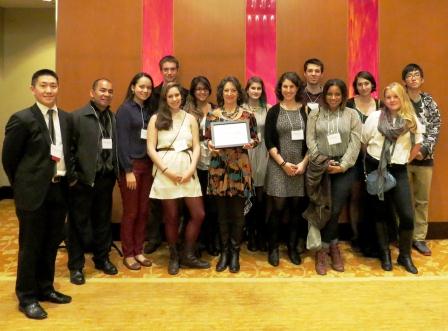
Clark University’s outstanding achievement in recycling and waste reduction was recognized by MassRecycle, a statewide recycling coalition of individuals, governments, businesses, institutions and non-profits, at an awards ceremony Nov. 13, in Boston.
MassRecycle’s 17th annual competition is divided into categories; last year Clark Dining Services placed first in the state for eating establishments. This year Clark placed third in the Institutional category, up against other colleges and universities, hospitals, corporations and non-profits.
“Clark University is incredibly proud to place 3rd among all institutions in the state of Massachusetts for the quality and impact of our campus recycling and diversion programs,” Jenny Isler, Sustainability Coordinator at Clark University, said. “We are even more proud of the fact that the first and second place winners were Harvard University and Tufts University – institutions that dedicate considerable resources to the same challenges that Clark University solves with pure grit and gumption.”
In 1992, a few students started Clark University’s recycling efforts by collecting office paper in a corner of the Goddard Library. Two decades later, the diversion rate is 46 percent, recycling is up 18 percent in one year, while waste decreased 26 percent in the same period, according to a report by Sustainable Clark. A Recycling Crew of work-study students picks up source-separated recyclables from designated areas in all 56 campus buildings. Every day the crew gathers recyclable material and creates seven categories to then further hand-sort and process the load into revenue streams, donations, reusable supplies and co-mingled recycling.
In 2011, an unaffiliated student group, the Recycling Initiative, persuaded the Student Council to invest $15,000 in new recycling bins for underserved areas on campus. Sustainable Clark interns, Clark’s Eco-Representatives, and the Recycling Crew also used the funding for a multi-level awareness campaign: volunteer-staffed waste audit sorted 650 pounds of dorm ‘garbage’ on the main quad and publicized the results, they provided hands-on recycling workshops to 60 Residential Advisors, 50 Peer Advisors, Help Desk students, senior administrative staff and other campus leaders, and 75 custodial and kitchen staff were trained and certified. Clark also re-purposed the old gymnasium bleachers as carpentry shop supplies for the Worcester School District, and reupholstered used furniture for the new Johnson-Sanford residence hall addition. Eco Reps ran a dorm-based compost collection, and collaborated with Dining Services and Sustainable Clark to make several major catered events zero waste. The Recycling crew also taught recycling at a neighborhood school and assisted in the fifth-graders’ Go Green campaign!
The energy and collaboration of all these different student groups to reduce waste demonstrates Clark’s motto “Challenge Convention, Change Our World.”
Already, the international Sustainable Consumption Research and Action Initiative plans their 2013 conference at Clark University, and University President David Angel has directed the Clark University Environmental Task Force to address further institutional waste reduction solutions. Supported by systems in place and a united campus effort, the current trend will prove to make 2012 a ground-breaking year for Clark University’s multi-faceted waste reduction and recycling program.
* Shown in the photo inset are, from left: Edward Hsieh, director of MassRecycle; Mel Valdes, Clark University custodian; Marla Carrera-Raleigh, Sustainable Clark Recycling Intern; Samantha Sandella, Recycling Crew member; Will Cutshall, Recycling Crew Captain; Stephanie Wong, Crew; Jenny Isler, Sustainability Coordinator at Clark University; Monika Szamalek, Recycling Crew Captain; Sharon Bort, Sustainable Clark Intern; Michael Osgood, Crew; Chloe Blaise, Crew; Olivia McGill, Recycling Captain; Lorelei Obermeyer, Crew; and Colin Tan, Eco Rep.
Founded in 1887 in Worcester, Massachusetts, Clark University is a small, liberal arts-based research university addressing social and human imperatives on a global scale. Nationally renowned as a college that changes lives, Clark is emerging as a transformative force in higher education today. LEEP (Liberal Education and Effective Practice) is Clark’s pioneering model of education that combines a robust liberal arts curriculum with life-changing world and workplace experiences. Clark’s faculty and students work across boundaries to develop solutions to contemporary challenges in the areas of psychology, geography, management, urban education, Holocaust and genocide studies, environmental studies, and international development and social change. The Clark educational experience embodies the University’s motto: Challenge convention. Change our world. www.clarku.edu
